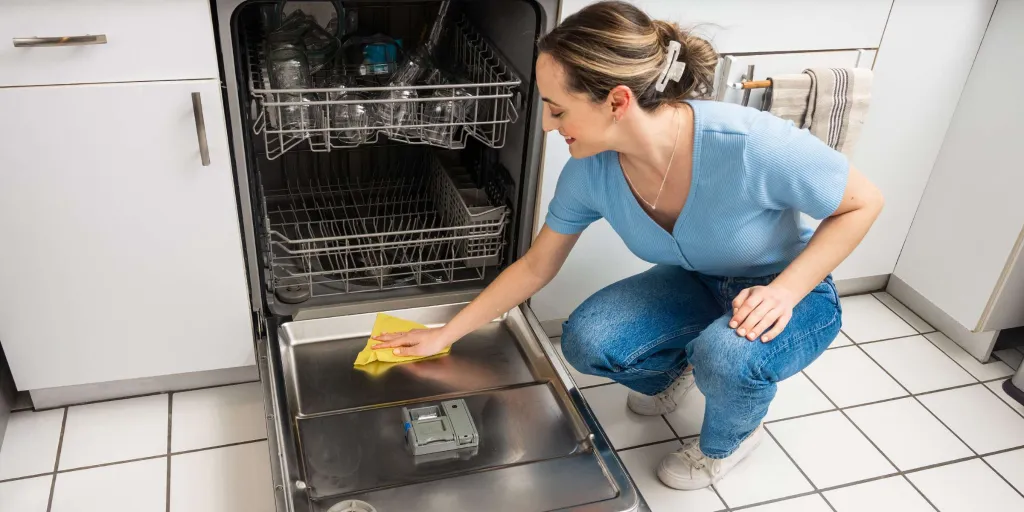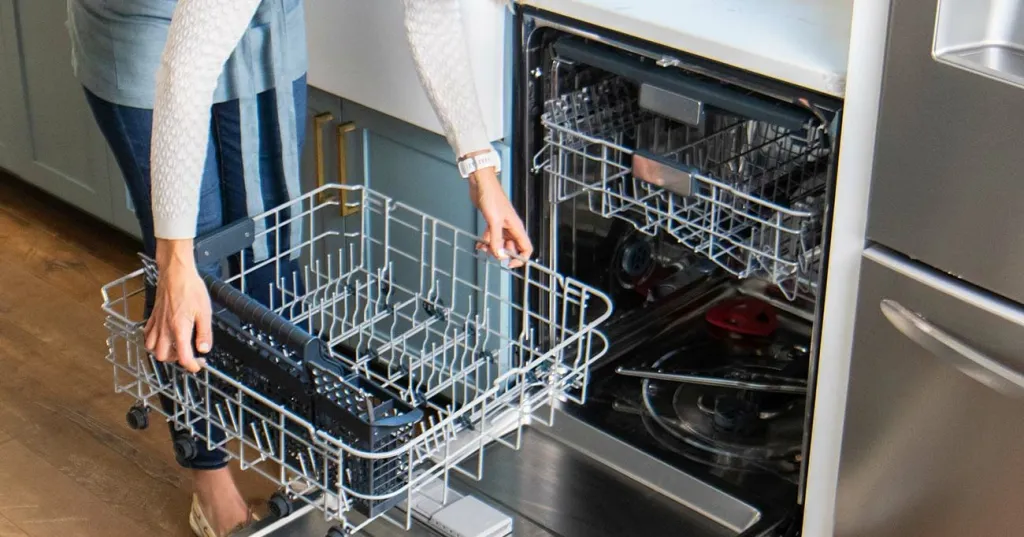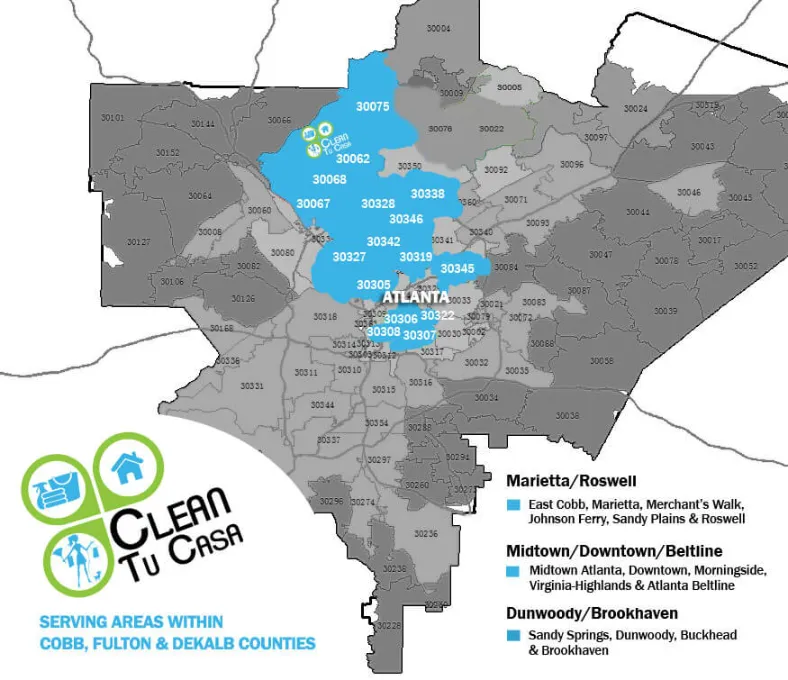Cleaning Tips
Published On
How to Clean a Dishwasher: Steps, Tips, and DIY hacks!
Written By
The dishwasher probably washes itself as it washes the dishes, right? Wrong. You’d be surprised by the amount of gunk you’d discover in your dishwasher once you start deep cleaning. That’s why we'll show you how to clean a dishwasher on National Wash Your Dishes Day.
Food particles, grease, oil, grime, and other residues could get stuck in your dishwasher, causing odors and your dishes not getting clean after washing them. You might find residue or dirty film left on your plates after washing them in the dishwasher. This results from not giving your dishwasher some TLC after a long time.
Since over 68% of the entire American population own dishwashers in their homes, learning how to clean one is a necessity. Regular cleaning is a crucial part of dishwasher maintenance. And here is how you can get it done.
Related: Complete Guide to Oven Care and Maintenance
Step-by-step guide on how to clean a dishwasher

1. Clear the Dishwasher of any dishes or debris
Before you start cleaning your dishwasher, you have to empty it of any dishes. This will help you get every corner and crevice properly. You should also clear the dishwasher of any debris or food particles you find. You can use a soft bristle brush to dislodge any debris that might be stuck. You could use an old toothbrush for tiny bits stuck in tiny spaces.
2. Check the dishwasher’s filter and clean it, if necessary
A dishwasher’s filter is required to keep it running efficiently for several years, so you must clean it often. Gunk and food particles easily get stuck in the filter resulting in dirty water, odor, and the breeding of microorganisms. To clean a dishwasher filter, you’ll need the help of an old toothbrush. Remove the filter from the dishwasher, empty it, and wash it with the help of a toothbrush and some dishwashing soap.
3. Clean the dishwasher’s spray arms
Food particles and debris could lodge in the spray arms of your dishwasher. This can reduce the pressure of the water and even contaminate it. So it’s essential to clean this part as well. You can do this with the help of a toothpick or even a flexible wire.
4. Clean the dishwasher’s interior and door
You’ll need some distilled white vinegar to clean the dishwasher's interior. Put a cup of vinegar in a dishwasher-safe bowl and place it at the bottom of your empty dishwasher. Run the dishwasher on a hot water cycle. This will break down food particles, grease, and any grime. Sprinkle a cup of baking soda on the bottom of your dishwasher, run another cycle to remove any lingering stains, and leave your dishwasher fresh.
To clean the doors, you must use a spray cleaner safe for stainless steel instead of any regular surface cleaner. This will leave the surface and door of your dishwasher sparkling and prevent scratches.
5. Remove hard water stains and rust buildup
Over time, you may notice stains in your dishwasher from hard water and rust. You might need help with what to do, but we are here to help you out. A citric acid dishwasher detergent, citric acid crystals, or even the regular household essential, lemon, could help you. Utilizing them in your deep clean will go a long way. Plus, it leaves your dishwasher with a wonderful citrus fragrance.
6. Sanitize the dishwasher
Knowing how to clean a dishwasher inside can only be complete if you also know how to sanitize the dishwasher. Food particles, debris, grease, oil, soap scum, and other gunk can breed harmful mold and fungi. The warm environment that the dishwasher provides will serve as even more of an encouragement. Disinfecting your dishwasher with hydrogen peroxide or some good old citric acid in the form of lemons will help to kill any bacteria, mold, or mildew. In your quest to disinfect, never use bleach on your dishwasher, as this could damage it.
Tips for Maintaining a Clean Dishwasher

Here are a few tips to help you maintain a clean dishwasher and ensure it looks and smells nice in between each deep clean session.
Related: 3 Holiday Dish Cleanup Hacks
Tip #1: Use dishwasher detergent and rinse-aid
You could be tempted to use regular dishwashing soap in your dishwasher, but that is not very wise. It will fill your dishwasher with many soap suds that could spill out onto your kitchen floors while still leaving your dishes dirty.
The suds in your regular dishwashing soap are what gets hand-washed dishes clean. However, for the dishwasher, this is different. The dishwashing detergent contains enzymes that break down food particles so that they are easily flushed away by water. It efficiently removes tough stains, grease, and bacteria that regular detergent can’t handle. It is also gentle on fragile glassware and cutlery.
The accompanying rinse-aid prevents the formation of droplets so that water quickly drains from surfaces instead of forming droplets as usual. This makes your dishes dry quicker and also prevents spotting on glassware.
Tip #2: Load the dishwasher properly
This is a crucial step in maintaining a clean dishwasher and ensuring that your dishes are washed properly. Every dish should go in the appropriate place. Fragile plates and glasses shouldn’t be stacked too close to prevent them clinking and chipping. Utensils should go in the utensil holder, flat plates should be stacked vertically on the racks, and so on. It’s also essential that you do not overload your dishwasher.
Tip #3: Run hot water before starting a cycle
You’ve probably heard that you should run hot water before starting a cycle, and might wonder why. It is important that you do this so the dishwasher is filled with hot water instead of lukewarm water while washing. Hot water is great at combatting grease, oil, and food stains as opposed to lukewarm or even cold water.
Tip #4: Use dishwasher-safe materials
To prevent damage, don’t clean your dishwasher with bleach or any other abrasive materials and substances. Always use materials that are dishwasher friendly.
This also extends to the dishes you put into your dishwasher. They should be resistant to high temperature, non-reactive, and strong enough to not get damaged from the water pressure. Dishwasher-friendly dishes include; ceramics, glass, stainless steel, opalware, and melamine. On the other hand, dishwasher-unfriendly materials include; non-stick and cast iron pans, aluminum, copper, wood, and plastic.
DIY Home Remedies for Cleaning a Dishwasher

We all love a good DIY, as it always goes a long way in saving us a couple of bucks. Here are a few DIY home remedies that will help you as you learn how to clean a dishwasher.
1. Vinegar and baking soda solution
If the question, ‘How do you deep clean a dishwasher?’ has been on your mind, look no further because this is the holy grail. Some people clean a dishwasher with vinegar alone, while some others clean a dishwasher with baking soda. Vinegar fights grease and grime, while baking soda deals with stains. Together, they are unstoppable, giving your dishwasher a fresh, clean look.
If you are also wondering how to clean a dishwasher drain properly, this mixture will also help you out. This solution can help with drain cleaning if you pour equal parts vinegar and baking soda into the bottom of your dishwasher and let it sit for 15 minutes. Run a rinse cycle at the highest heat setting to clean the drain.
#2 Citric acid and hot water
Put a teaspoon of citric acid crystals into the detergent cup and run a hot water cycle. The acidity of the citric acid will break down soap scum, kill mold, bacteria, and get rid of hardware stains, grease, and oil. The hot water will help the citric acid to penetrate any hardened gunk.
#3 Lemon juice and salt solution
A cup of lemon juice with two tablespoons of sea salt on the top shelf and a complete wash cycle removes grease and buildup, especially on the walls of your dishwasher.
#4 Hydrogen peroxide and baking soda solution
Mix three tablespoons of hydrogen peroxide with two cups of baking soda to get rid of harmful mold, fungi, and bacteria. Mold a few balls from this mixture and allow to dry. Place balls at the bottom of the dishwasher and run a long hot cycle.
Conclusion
Cleaning a dishwasher regularly will help to lengthen its lifespan, ensuring that it’s in good working condition for several years. It ensures your dishes are thoroughly cleaned and sanitized, preventing any weird funky smells from developing in your kitchen. It will also prevent your dishwasher from developing silly faults that cost much money to repair.
A good clean will only take an hour or less, and your dishwasher will be as good as new in a short time.
